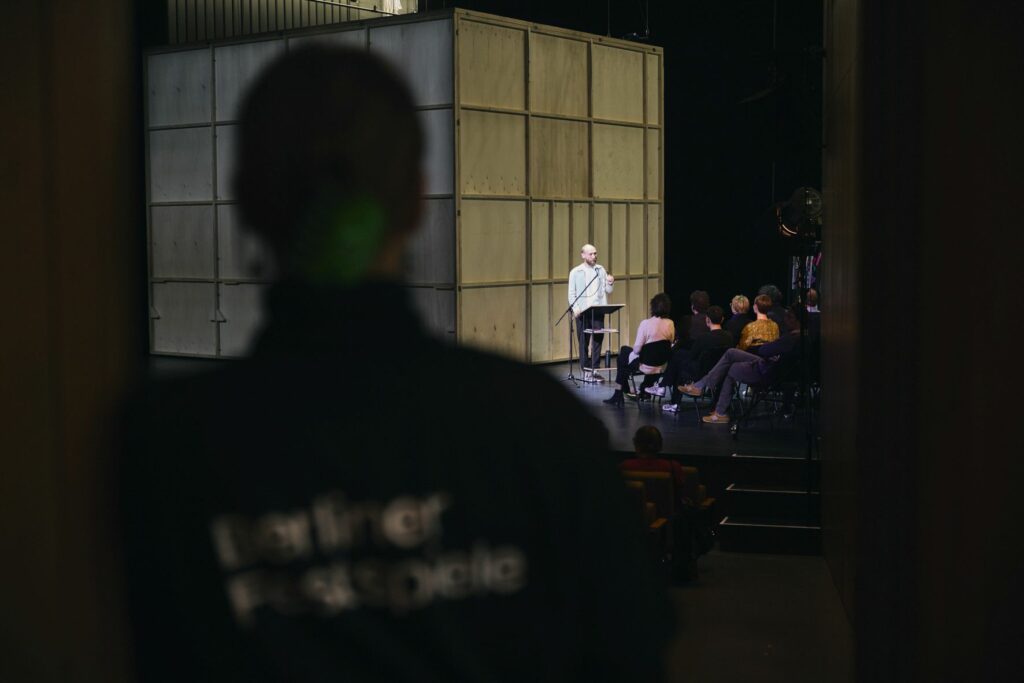–
„What do you think of this part of the play from the point of view of a German audience?“
That’s what the Dutch director of the play asked me during the follow-up discussion. „I am not a German audience, I am a Jewish audience,“ I replied to him, almost without further thinking. A confrontational silence broke out in the room – the director was stumped. Luckily, I was sitting in the front row, so no one could turn to me to look at the face of the freshly-outed Jewish person. Who would have thought that it is still not entirely safe in Germany to reveal one’s Jewish identity – not even as a secular, non-religious Jewish person? In general, everything in this country that is not Christian and white and does not speak German without an accent somehow seems to be kind of questionable.
When I was a child, I once said that I had Jewish ancestors. Then I heard an affected „Oh, I’m so sorry.“
Since people in Germany like to talk about – and not with – Jewish people, I would like to comment on some of this year’s invited „remarkable“ productions at the Theatertreffen from that very perspective.
The ensemble of „Der Bus nach Dachau“ travelled as a co-production of the Schauspielhaus Bochum and the Internationaal Theater Amsterdam, and offered a very versatile theatre evening. And by that, I don’t just mean what was happening on stage. What was on stage was entertaining, brave, and educating – especially for a primarily German audience.
Many, often rhetorical, questions were asked in the play that I had never heard before. I was particularly struck by the question of whether the Shoah would have more impact today as a fictional narrative than as a real part of history. Or why many film productions move in the direction of victimising the Germans living at that time, and how one can escape this „memory rape“.
Yet, during the follow-up discussion, questions about working with living Jewish voices were consistently dodged. The very contemporary relevance of the whole subject (the piece gives itself the title of being a 21st Century memory piece) in the face of rising antisemitism in Germany was thus deprived of a stage. Instead, the ensemble emphasised that the production „Der Bus nach Dachau“ is not about Jewish prisoners at all, because „there were no Jews in Dachau“, but „only political prisoners”. Spoiler: That’s not true. They were there. And assuming that the play really wasn’t supposed to be about the Jewish victims of the Shoah, one question still arises after watching the play: Why were particularly antisemitic terms reproduced on stage, albeit in alienating Dutch with Nazi German (Fraktur style) surtitles?
While „Der Bus nach Dachau“ deals with questions of remembrance culture, there was another play among the performances at the 2023 Theatertreffen that is in line with the fascism theme.
An interesting look behind the scenes at the emergence of antisemitic structures within a community was provided by Lucia Bihler’s and Alexander Kerlin’s „Die Eingeborenen von Maria Blut“, which was presented by Burgtheater Wien. However, it had a very classical character, and no real political statement (except for the swastikas and Hitler salutes, of course) – which is currently a very prevalent problem.
The political approaches of most of the invited productions are generally a bit shallow. If I was Theatertreffen, I would have definitely wished for and expected something else for my 60th birthday.
I would like to see more profound discourses on this topic in the future in the oh-so-discursive theatre community. Why were these plays invited to this year’s Theatertreffen, when the elephant in the room called Antisemitism is being constantly ignored? Besides, there should be dialogues with Jewish people, and not just about them. Because yes, they do exist – we do.
P. S. Don’t forget that the elephant obviously also has many other names.
